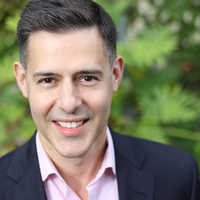
John Corvino
John Corvino, Ph.D., is Dean of the Irvin D. Reid Honors College and Professor of Philosophy at Wayne State University.
Corvino's research mainly focuses on controversial "culture war" issues surrounding sexuality and marriage. He is the author or co-author of three books from Oxford University Press: Debating Same-Sex Marriage (with Maggie Gallagher), What’s Wrong with Homosexuality?, and, most recently, Debating Religious Liberty and Discrimination, with Ryan T. Anderson and Sherif Girgis.
In addition to his books and scholarly articles, Corvino has contributed to The New York Times, the Los Angeles Times, the Detroit Free Press, the Huffington Post, The New Republic, Slate, Commonweal, and other popular venues. He is the recipient of several teaching awards, including the Wayne State University President’s Award for Excellence in Teaching and a 2012 Distinguished Professor of the Year Award from the Presidents Council of the State Universities of Michigan. In the last 25 years, he has spoken at over 250 campuses on issues of sexuality, ethics, and marriage. His online videos have received over two million views.
Address: Detroit, Michigan, United States
Corvino's research mainly focuses on controversial "culture war" issues surrounding sexuality and marriage. He is the author or co-author of three books from Oxford University Press: Debating Same-Sex Marriage (with Maggie Gallagher), What’s Wrong with Homosexuality?, and, most recently, Debating Religious Liberty and Discrimination, with Ryan T. Anderson and Sherif Girgis.
In addition to his books and scholarly articles, Corvino has contributed to The New York Times, the Los Angeles Times, the Detroit Free Press, the Huffington Post, The New Republic, Slate, Commonweal, and other popular venues. He is the recipient of several teaching awards, including the Wayne State University President’s Award for Excellence in Teaching and a 2012 Distinguished Professor of the Year Award from the Presidents Council of the State Universities of Michigan. In the last 25 years, he has spoken at over 250 campuses on issues of sexuality, ethics, and marriage. His online videos have received over two million views.
Address: Detroit, Michigan, United States
less
Uploads
Papers by John Corvino
Many such questions have arisen in response to same-sex marriage: How should we treat county clerks who do not wish to authorize such marriages, for example; or bakers, florists, and photographers who do not wish to provide same-sex wedding services? But the conflicts extend well beyond the LGBT rights arena. How should we treat hospitals, schools, and adoption agencies that can't in conscience follow antidiscrimination laws, healthcare mandates, and other regulations? Should corporations ever get exemptions? Should public officials?
Should we keep controversial laws like the Religious Freedom Restoration Act, or pass new ones like the First Amendment Defense Act? Should the law give religion and conscience special protection at all, and if so, why? What counts as discrimination, and when is it unjust? What kinds of material and dignitary harms should the law try to fight-and what is dignitary harm, anyway?
Beyond the law, how should we treat religious beliefs and practices we find mistaken or even oppressive? Should we tolerate them or actively discourage them?
In point-counterpoint format, Corvino, Anderson and Girgis explore these questions and more. Although their differences run deep, they tackle them with civility, clarity, and flair. Their debate is an essential contribution to contemporary discussions about why religious liberty matters and what respecting it requires.
Is homosexuality unnatural? Does the Bible condemn it? Are people born gay (and should it matter either way)? Corvino approaches such questions with precision, sensitivity, and good humor. In the process, he makes a fresh case for moral engagement, forcefully rejecting the idea that morality is a "private matter." This book appears at a time when same-sex marriage is being hotly debated across the U.S. Many people object to such marriage on the grounds that same-sex relationships are immoral, or at least, that they do not deserve the same social recognition as heterosexual relationships. Unfortunately, the traditional rhetoric of gay-rights advocates--which emphasizes privacy and tolerance--fails to meet this objection. Legally speaking, when it comes to marriage, "tolerance" might be enough, Corvino concedes, but socially speaking, marriage requires more. Marriage is more than just a relationship between two individuals, recognized by the state. It is also a relationship between those individuals and a larger community. The fight for same-sex marriage, ultimately, is a fight for full inclusion in the moral fabric. What is needed is a positive case for moral approval--which is what Corvino unabashedly offers here.
Corvino blends a philosopher's precision with a light touch that is full of humanity and wit. This volume captures the voice of one of the most rational participants in a national debate noted for generating more heat than light.